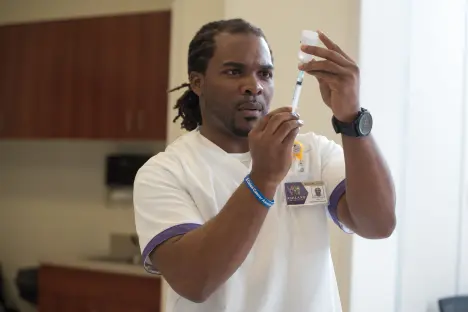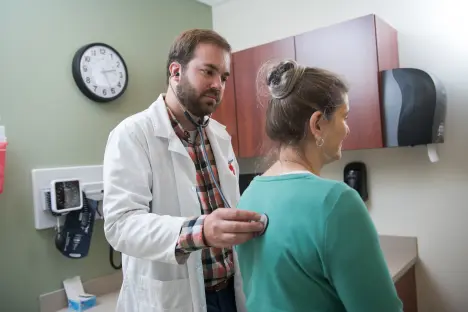
Nurse Educator Certificate Program Overview
Do you want to influence the next generation of nurses? Sign up for Ashland University’s online Nurse Educator Certificate program. This program prepares nurses to teach in a nursing education program or healthcare setting.
There has never been a greater need for nurse educators. A 2019 survey by the American Association of Colleges of Nursing reports a nurse faculty vacancy rate of 7.2 percent; it also estimates that one-third of current nurse faculty are expected to retire by 2025.

Is a Career as a Nurse Educator Right for You?
If you are a nurse who wants to influence the next generation of nurses, you may be interested in becoming a nurse educator. A nurse educator is a professional who teaches in a nursing education program or healthcare setting, using advanced nursing knowledge and teaching skills. To become a nurse educator, you need to complete a Nurse Educator Certificate program, which prepares you for the academic and practice environments of nursing education.

Learning Experiences
The Nurse Educator Certificate program gives you the advanced nursing knowledge needed for a leadership role, with course content specific to the academic environment, including:
- Academic philosophy and admission
- Policies
- Quality improvement
- Curriculum development
- Learning theories
- Evidence-based teaching
You'll have access to faculty mentors with more than 40 years of teaching experience in educational and healthcare settings. Upon completion of the Nurse Educator Certificate Program, you’ll be able to:
- Exhibit professional, ethical behaviors in the multidimensional role of Nurse Educator.
- Facilitate learning using teaching strategies grounded in educational theory and evidence-based teaching practices, based on students’ unique learning needs.
- Engage learners, faculty colleagues and clinical agency stakeholders in promoting safe, positive learning environments.
- Implement a variety of assessment and evaluation strategies .
- Collaborate with colleagues to revise or create curriculum based on research, healthcare trends, learner needs and program outcomes.
- Provide leadership for organizational change in the various learning environments of the academic or practice community.
- Participate in continuous quality improvement measures in teaching and learning.
- Disseminate nursing and teaching knowledge to a wide range of audiences through a variety of venues.
- Advocate for nursing, nursing education and learners through political and institutional learning environments.
Curriculum
The program begins in the fall with four, 16-week online courses. The courses include 12 credit hours of graduate-level coursework and a 48-hour practicum with a highly-qualified nursing education faculty member. The courses are:
- NUR 530: Nurse Educator Role
- NUR 531: Nursing Curriculum Development and Design
- NUR 532: Facilitating the Teaching and Learning Process
- NUR 533: Principles and Practices of Assessment and Evaluation
View the Academic Catalog for complete certificate requirements.
Admissions Requirements
- Hold a current, valid license to practice as a Registered Nurse in at least one U.S. state or territory.
- Have a Bachelor of Science in Nursing degree, Master of Science in Nursing degree or doctoral degree in nursing with a minimum 3.0 GPA.

Graduate Outcomes
Upon completion of this program, you may be eligible to apply for the following certifications:
- Nursing Professional Development, American Nurses Credentialing Center (ANCC)
- Certified Academic Clinical Nurse Educator (CNE®cl), National League for Nursing (NLN)
- Certified Nurse Educator (CNE®), National League for Nursing (NLN)
Refer to the certification websites for specific eligibility requirements.

Internships and Careers
The many settings for employment as a nurse educator include:
- A practice setting, where healthcare systems employ nurse educators in various capacities where healthcare is delivered.
- An academic setting, where nurse educators are needed for all levels of education, including PN, ADN, BSN, RN to BSN, MS/MSN and DNP/Ph.D. programs.
- Simulation/technology centers, where nurse educators expand practice experiences and competencies of the nursing workforce.
- Pre-licensure nursing education programs, where the demand continues for nursing faculty and teaching assistants.